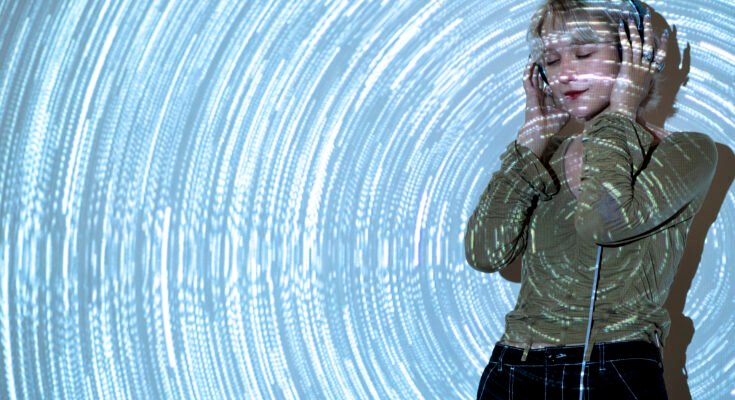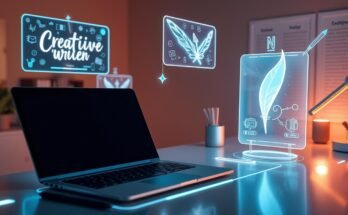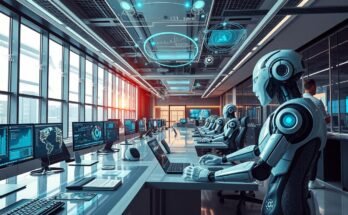AI use in Music Generated
A big change is happening in music making – AI-generated music is here. It’s changing how we think about music and creativity. It’s opening up new ways to make and enjoy music.
AI is making music more complex and personal. It can mix different music styles together. It can even create new songs that no one has heard before.
This article will explore AI-generated music. We’ll look at the technology behind it, its impact on music, and what it means for the future. Let’s dive into this exciting new world where humans and machines create music together.

Key Takeaways
- Artificial intelligence is changing music making, making it more innovative and personal.
- AI music mixes different styles, breaks old music rules, and changes how we see creativity.
- AI is changing jobs in music, creating new paths and ways to work together.
- There are big talks about AI music’s ethics, like authenticity and keeping music’s soul.
- AI will likely change music making a lot, making it more creative and fun for listeners.
Understanding AI-Generated Music: A New Era of Creativity
The music world is changing fast with AI technology leading the way. We explore how AI music generation works and its history. This section dives into the exciting world of AI music creation.
Defining AI Music Generation
AI music generation uses machine learning and neural networks to make new music. These systems study lots of music to find patterns and rhythms. They then create new melodies and harmonies.
The Evolution of Computer-Generated Sound
Computer music started in the 1950s with early experiments. Over time, better computers and software changed music making. Now, we have AI composers and algorithmic music generation.
Key Components of AI Music Systems
- Machine learning in music: AI music systems use complex algorithms to learn from lots of music. They can make new songs that sound like and go beyond human music.
- Neural networks: These networks help AI music systems understand and copy musical patterns. They are key to many AI music tools.
- Generative models: AI music systems use models like Markov chains to make new songs. They mix and match elements from their training data.
AI music generation is growing fast. It’s changing how we think about music, blending human creativity with machine smarts.
The Technology Behind AI Music Creation
The world of AI music is built on new technologies. Deep learning is at the core, making music creation possible in new ways.
Natural language processing helps AI understand music patterns. This lets AI create music that sounds like it was made by humans.
Generative adversarial networks (GANs) are also key. They have a generator and a discriminator that compete. This makes AI music sound very real.
Music AI software brings all these technologies together. It lets both pros and hobbyists make music with AI.
| Technology | Role in AI Music Creation |
|---|---|
| Deep Learning | Enables AI systems to analyze and understand musical structures and patterns |
| Natural Language Processing | Helps AI systems interpret and generate language-like musical compositions |
| Generative Adversarial Networks (GANs) | Produce music that is indistinguishable from human-composed works |
| Music AI Software | Integrates various algorithms and techniques to empower music creation |
These technologies have changed music creation forever. They’ve opened up new ways to make and enjoy music.

How Machine Learning Transforms Musical Composition
AI and machine learning are changing how we make music. They use neural networks and deep learning to help composers. This lets them create in new and exciting ways.
Neural Networks in Music Generation
Neural networks are key in AI music making. They learn from lots of music to understand harmony and melody. This lets AI make music that sounds great and even better than some human songs.
Deep Learning Algorithms for Sound Synthesis
Deep learning has changed sound making too. AI can now make digital instruments that sound real. It can make everything from strings to weird synth sounds. This lets musicians explore new sounds.
Pattern Recognition in Musical Structures
AI is also good at finding and changing musical patterns. It can see the structure of songs and make new versions. This helps composers make new and interesting songs with AI’s help.
| AI Composition Techniques | Music Data Analysis | Automated Harmony Generation | AI-Assisted Songwriting |
|---|---|---|---|
| Neural networks in music generation | Deep learning for sound synthesis | Pattern recognition in musical structures | Collaborative composition with AI |

“The integration of AI in music composition has the potential to unlock new realms of creativity, allowing artists to push the boundaries of what’s possible in the art form.”
AI music making is getting better all the time. It’s changing how we make music. From making harmony to helping write songs, AI is making music creation exciting and new.
Popular AI Music Generation Tools and Platforms
The world of music has changed a lot with AI tools and platforms. These tools help musicians, producers, and hobbyists explore new ways to make music. They offer AI music software, automated music production, and AI-powered DAWs. The world of AI-generated music is growing fast.
AIVA is a top AI music software that makes original music with deep learning. Amper Music is another big name that lets users make custom soundtracks. Google’s Magenta project is also making big steps in AI-powered DAWs.
These tools are not just fun; they change how we make and listen to music. They let musicians and producers try new things, work faster, and express themselves in new ways. As AI gets better, the future of music creation apps and AI music looks very promising.
- AIVA: A leading AI music software that uses deep learning to compose original music.
- Amper Music: An automated music production platform that allows users to create custom, AI-generated soundtracks.
- Google’s Magenta Project: A research initiative exploring the intersection of machine learning and art, contributing to the development of AI-powered DAWs.

“AI-powered tools and platforms are transforming the way we create and consume music, unlocking unprecedented levels of musical expression.”
The Impact of AI on Professional Musicians
AI-generated music is changing the game for musicians. It brings both challenges and new chances. Musicians must learn to work with AI, making music together.
Changing Roles in the Music Industry
AI is shaking up the music world. It’s mixing human and machine music. Now, producers and engineers use AI tools in their work.
Composers and songwriters face a new challenge. AI can make music that’s just as good as theirs.
Collaboration Between AI and Human Artists
- Some musicians team up with AI to boost their creativity.
- AI can start musical ideas or help improve human songs.
- This partnership could lead to new music possibilities.
New Career Opportunities
AI in music is opening up new jobs. There are AI music producers, sound designers, and consultants. They help mix human and machine music.

| AI-Powered Roles | Key Responsibilities |
|---|---|
| AI Music Producer | Use AI to make music; work with humans to add AI touches |
| AI Sound Designer | Make new sounds with AI; use AI to create unique sounds |
| AI Music Consultant | Help artists, labels, and studios use AI in music |
The future of music will depend on AI and human artists working together. This partnership will shape music production and open up new chances for musicians.
Legal and Copyright Considerations in AI Music
The music world is changing fast with AI. Now, we face new legal and copyright issues. These include who owns AI music, licensing, and the rules for AI music.
One big worry is AI music copyright. Traditionally, music law focused on human creators. But AI music makes it hard to say who owns a song. It’s unclear if it’s the AI, the people who trained it, or the company that made the tech.
Also, music licensing for AI music is tricky. Old licensing rules were made for human music. We need new rules for AI music, thinking about originality, how it’s used, and more.
- Understanding AI-generated content ownership and its legal side
- Looking into new music licensing for AI songs
- Dealing with copyright and intellectual property in the AI music world
The music world is diving into AI music. But we must think about legal and copyright stuff. This will help make sure AI music is used right and fairly.
“The rise of AI-generated music has introduced a new layer of complexity to the music industry’s legal and copyright landscape. Navigating these challenges will be critical for artists, producers, and the industry as a whole to ensure the fair and ethical use of this transformative technology.”
Applications of AI-Generated Art and Music
AI music generation is getting better fast. It’s changing how we hear music in many places. This includes games, ads, and streaming services.
Gaming Industry Integration
The gaming world was quick to use AI music. It makes soundtracks that change with the game. This makes games more fun and real for players.
Advertising and Marketing Uses
AI music is great for ads and marketing. It lets companies make catchy tunes and playlists. This helps them connect with their audience better.
Streaming Platform Innovations
Music streaming sites are using AI too. They make soundtracks that fit what you like. This means you get music that’s just right for you.
AI music is growing in many fields. We’ll see new and exciting uses of it soon.
| Commercial Application | Key Features | Benefits |
|---|---|---|
| Gaming Industry | Adaptive soundtracks, personalized audio experiences | Enhanced player immersion, dynamic audio environments |
| Advertising and Marketing | Customizable jingles, personalized playlists | Memorable audio branding, targeted marketing campaigns |
| Streaming Platforms | Adaptive soundtracks, personalized recommendations | Engaging and tailored listening experiences for users |
The Future of Music Production with AI
Music production is changing fast with AI. AI is set to change the music world in big ways. Next-gen music tech and AI instruments will change how we make music.
AI music trends are getting better. Neural networks and deep learning will make AI music smarter. This mix of human and machine will open up new sounds.
AI will also make music making easier. AI can help with mixing, mastering, and even writing songs. This means artists can be more creative and productive.
AI and musicians will work together more. AI instruments will help artists make music that’s never been heard before. This will take music to new places.
AI is changing music forever. It’s changing how we make, listen to, and enjoy music. With AI, the future of music is endless.
| AI Music Trends | Future of Sound Design | Next-Gen Music Tech | AI-Powered Instruments |
|---|---|---|---|
| Neural network-generated compositions | Innovative sonic textures and atmospheres | Automated mixing and mastering tools | Collaborative AI-human music creation |
| Deep learning algorithms for sound synthesis | Predictive songwriting capabilities | Real-time audio processing and effects | AI-driven musical assistants |
| Pattern recognition in musical structures | Generative and adaptive sound design | Intelligent audio analysis and optimization | Augmented creative workflows |
The future of music with AI is exciting. We’re entering a time of endless creativity and collaboration. This will change music forever.
“The integration of AI in music production will usher in a new era of artistic expression, where the boundaries between human and machine creativity are blurred, unleashing boundless possibilities for the future of sound.”
Ethical Implications of AI in Music Creation
AI is changing the music world, but we must think about the ethics. AI music raises big questions about realness, value, and cultural impact. It also affects how we keep musical traditions alive.
Authenticity and Artistic Value
Many worry about AI’s authenticity. AI can make music that sounds real, but is it truly art? People debate if AI music is art or just a copy of human creativity. This makes us rethink what art is and the role of the human creator.
Cultural Impact and Preservation
AI’s rise also worries about cultural impact and keeping music alive. AI music might mix up or take over traditional sounds. This could harm cultural identities and unique musical traditions, especially for minority groups. We need to find a way to keep cultural diversity alive while using new tech.
FAQ
What is AI-generated music?
AI-generated music is made by computers using artificial intelligence. They learn from lots of music to create new sounds. This way, they make music that’s both new and unique.
How does AI transform the music creation process?
AI changes music making by doing some tasks for us. It helps with things like making chords and melodies. This lets artists focus on the creative parts.
What are some popular AI music generation tools?
Top AI music tools include AIVA, Amper Music, and Google’s Magenta project. There are also tools like Boomy and Orb Composer. These tools use AI to make music on their own.
How is AI impacting the music industry?
AI is changing how we make and share music. It’s making new jobs and ways for humans and machines to work together. This is shaking up old music ways.
What are the legal and copyright considerations for AI-generated music?
The law around AI music is still being figured out. There’s talk about who owns the music and how to license it. It’s a big challenge as AI music grows.
What are the implications of AI in music creation?
Using AI in music raises big questions. Like, is the music really made by a person? And what about keeping cultural music alive? It’s a tough balance to find.



